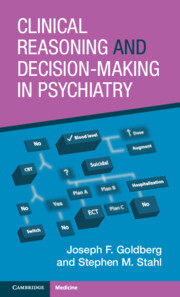Book contents
- Clinical Reasoning and Decision-Making in Psychiatry
- Reviews
- Clinical Reasoning and Decision-Making in Psychiatry
- Copyright page
- Contents
- Foreword
- Preface
- 1 Making Sense of the Senseless: How to Gather and Organize Pertinent Information
- 2 The Approach to Diagnostic Ambiguity
- 3 What the Patient Isn’t Telling You: When Seeing Is Not Believing
- 4 Shared Decision-Making
- 5 Deciding on Appropriate Treatment Modalities: Medication, Psychotherapy, Hospitalization, and Other Levels of Care
- 6 Measurement-Based Care and Applying Statistical Concepts to the Individual Patient
- 7 Hypothesis-Testing and Crafting Patient-Specific Decision Trees
- 8 Decision Points in Iterative Pharmacotherapy
- 9 Hierarchical and Complex Pharmacotherapy Decision-Making
- 10 Prioritizing the Components of Any Decision-Making Model
- Index
- References
3 - What the Patient Isn’t Telling You: When Seeing Is Not Believing
Published online by Cambridge University Press: 25 March 2024
- Clinical Reasoning and Decision-Making in Psychiatry
- Reviews
- Clinical Reasoning and Decision-Making in Psychiatry
- Copyright page
- Contents
- Foreword
- Preface
- 1 Making Sense of the Senseless: How to Gather and Organize Pertinent Information
- 2 The Approach to Diagnostic Ambiguity
- 3 What the Patient Isn’t Telling You: When Seeing Is Not Believing
- 4 Shared Decision-Making
- 5 Deciding on Appropriate Treatment Modalities: Medication, Psychotherapy, Hospitalization, and Other Levels of Care
- 6 Measurement-Based Care and Applying Statistical Concepts to the Individual Patient
- 7 Hypothesis-Testing and Crafting Patient-Specific Decision Trees
- 8 Decision Points in Iterative Pharmacotherapy
- 9 Hierarchical and Complex Pharmacotherapy Decision-Making
- 10 Prioritizing the Components of Any Decision-Making Model
- Index
- References
Summary
Part of the intellectual intrigue for many people who choose a career in mental health is the challenge of reading between the clinical lines and sussing out information that transcends the obvious. Do patients’ words and behaviors align? Are subjective symptoms consistent with overt functioning? Does a clinical narrative conform to a set of circumstances? How does a clinician know when someone is lying, concealing key information, embellishing facts, or otherwise operating with an agenda? Or what if the patient has no vocabulary for accurately communicating their internal experience, and it is left to the clinician to deduce what may actually be happening for them internally? A clinician’s ability to recognize the unspoken parameters of psychiatric communication pertains to many if not most forms of mental illness, either by intention or happenstance, since patients themselves may not always be fully aware of what it is that they want or need. Clinical decision-making can only be as sound and logical as the quality of information made available to the decision-maker. Herein lies the challenge both for assessment and treatment planning when the patient is less than forthcoming, deceptive, confabulating, confused, denying, demented, delirious, malingering, ashamed, scared, alexithymic, misinformed, or otherwise less than a full-fledged participant in their own care.
- Type
- Chapter
- Information
- Clinical Reasoning and Decision-Making in Psychiatry , pp. 52 - 79Publisher: Cambridge University PressPrint publication year: 2024

